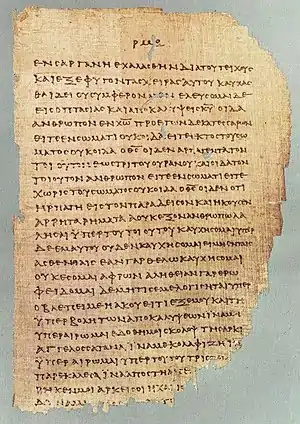2 Corinthians 6
2 Corinthians 6 is the sixth chapter of the Second Epistle to the Corinthians in the New Testament of the Christian Bible. It is authored by Paul the Apostle and Timothy (2 Corinthians 1:1) in Macedonia in 55–56 CE.[1]
| 2 Corinthians 6 | |
|---|---|
 A folio of Papyrus 46 (written ca. AD 200), containing 2 Corinthians 11:33–12:9. This manuscript contains almost complete parts of the whole Pauline epistles. | |
| Book | Second Epistle to the Corinthians |
| Category | Pauline epistles |
| Christian Bible part | New Testament |
| Order in the Christian part | 8 |
Text
The original text was written in Koine Greek. This chapter is divided into 18 verses.
Textual witnesses
Some early manuscripts containing the text of this chapter are:
- Papyrus 46 (~AD 200)
- Codex Vaticanus (325–350)
- Codex Sinaiticus (330–360)
- Codex Alexandrinus (400–440)
- Codex Ephraemi Rescriptus (~450)
- Codex Freerianus (~450; extant verses 6–8,16–18)
- Codex Claromontanus (~550)
Old Testament references
Verse 2
Paul quotes the first part of Isaiah 49:8 using the Septuagint version.[2] The full text of this verse reads:
- Thus saith the Lord,
- "In an acceptable time have I heard thee, and in a day of salvation have I succored thee: and I have formed thee, and given thee for a covenant of the nations, to establish the earth, and to cause to inherit the desert heritages".[3]
The promised hearing and salvation are offered first to the "suffering servant" in the time of the prophet Isaiah, then to Christ according to Christian interpretation of the servant songs, and finally, here, to the Christian people.[2] Paul adds that the day concerned is "now".
Verse 14
- Do not be unequally yoked together with unbelievers. For what fellowship has righteousness with lawlessness? And what communion has light with darkness?[4]
- "Do not be unequally yoked together with unbelievers": may allude to the law in Deuteronomy 22:10 which is understood not to forbid civil society and converse with unbelievers, but to prohibit joining unbelievers in acts of idolatry, as one of the arguments is, "what agreement has the temple of God with idols?" which seemingly happened at that time (cf. 1 Corinthians 10:14; 1 Corinthians 10:20–22).[5]
- "What fellowship has righteousness with lawlessness" (or KJV: unrighteousness"): This "righteousness" means righteous persons, having the kingdom of God in them.[5]
See also
- Transfiguration of Jesus
- Other related Bible parts: Leviticus 26, Isaiah 49, Isaiah 52, Isaiah 55, Psalm 69, Romans 8, Revelation 6, Revelation 21
References
Sources
- MacDonald, Margaret (2007). "66. 2 Corinthians". In Barton, John; Muddiman, John (eds.). The Oxford Bible Commentary (first (paperback) ed.). Oxford University Press. pp. 1134–1151. ISBN 978-0199277186. Retrieved February 6, 2019.
External links
- 2 Corinthians 6 King James Bible - Wikisource
- English Translation with Parallel Latin Vulgate
- Online Bible at GospelHall.org (ESV, KJV, Darby, American Standard Version, Bible in Basic English)
- Multiple bible versions at Bible Gateway (NKJV, NIV, NRSV etc.)
